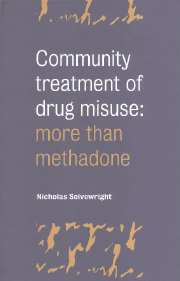Book contents
- Frontmatter
- Contents
- Foreword by Professor John Strang
- Preface and acknowledgements
- Introduction: community treatment in context
- Part I Treatments
- Part II Providing clinical services
- 5 Community drug services
- 6 Treatment of drug misuse in primary care
- 7 Balancing security and accessibility
- 8 Dual diagnosis – drug misuse and psychiatric disorder
- Epilogue Future directions
- Appendix 1 Protocols for quick detoxification from heroin
- Appendix 2 Opioid equivalent dosages
- Glossary
- References
- Index
6 - Treatment of drug misuse in primary care
Published online by Cambridge University Press: 17 August 2009
- Frontmatter
- Contents
- Foreword by Professor John Strang
- Preface and acknowledgements
- Introduction: community treatment in context
- Part I Treatments
- Part II Providing clinical services
- 5 Community drug services
- 6 Treatment of drug misuse in primary care
- 7 Balancing security and accessibility
- 8 Dual diagnosis – drug misuse and psychiatric disorder
- Epilogue Future directions
- Appendix 1 Protocols for quick detoxification from heroin
- Appendix 2 Opioid equivalent dosages
- Glossary
- References
- Index
Summary
Intorduction
The treatment of drug misusers in primary care is a controversial subject which arouses particularly strong feelings. Although there are many examples of entirely satisfactory treatment and of impressive schemes run by primary care physicians, the problems of managing this group in the primary care setting are also frequently highlighted. Around the time I came to Sheffield, the leading article in a primary care newsletter exhorted physicians to ‘man the barricades’ against involvement in treating drug misusers, which was a reaction to a previous over-optimistic plan for most drug misuse treatment to take place routinely in that setting. There is certainly no room for naivety in considering drug misuse and primary care, as the primary care situation is especially vulnerable to exploitation by such patients, and most physicians know this very well.
In planning services there must be recognition of both the problems and the advantages of treatment in primary care, and we will discuss these here. There is wide variation in the extent to which primary care physicians become engaged in managing drug misusers, and this will be examined in relation to attitudes, training and other aspects. The chapter mainly adopts the perspective of treatment in the UK, where there are no major restrictions on managing drug misusers in primary care, and therefore there is substantial experience to draw on.
Problems
The particular problems of treatment in primary care are identified first, as these strongly influence attitudes and approaches to treatment.
- Type
- Chapter
- Information
- Community Treatment of Drug MisuseMore than Methadone, pp. 167 - 175Publisher: Cambridge University PressPrint publication year: 1999



